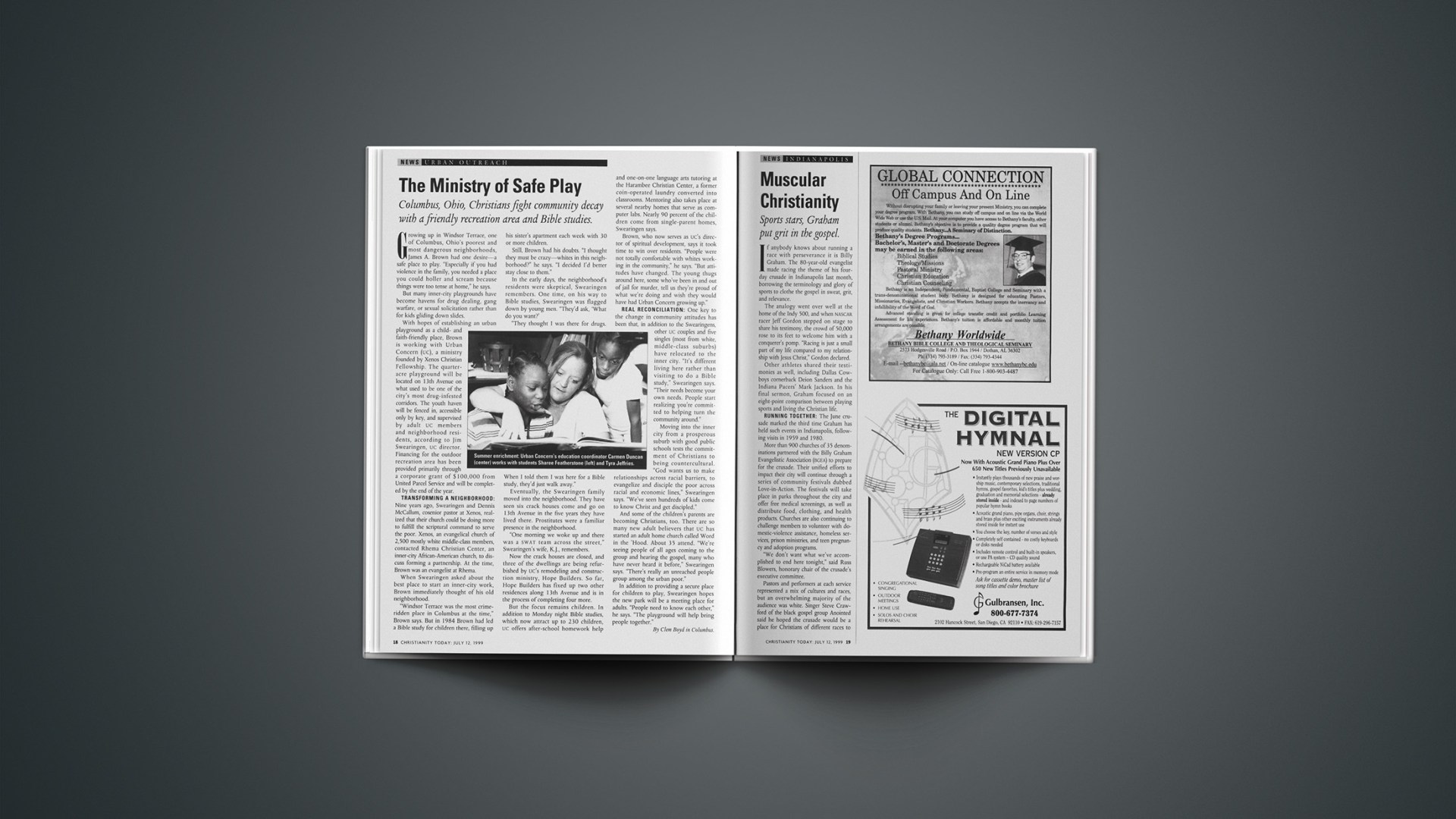Growing up in Windsor Terrace, one of Columbus, Ohio’s poorest and most dangerous neighborhoods, James A. Brown had one desire—a safe place to play. “Especially if you had violence in the family, you needed a place you could holler and scream because things were too tense at home,” he says.
But many inner-city playgrounds have become havens for drug dealing, gang warfare, or sexual solicitation rather than for kids gliding down slides.
With hopes of establishing an urban playground as a child- and faith-friendly place, Brown is working with Urban Concern (UC), a ministry founded by Xenos Christian Fellow ship. The quarter-acre playground will be located on 13th Avenue on what used to be one of the city’s most drug-infested corridors. The youth haven will be fenced in, accessible only by key, and supervised by adult UC members and neighborhood residents, according to Jim Swearingen, UC director. Financing for the outdoor recreation area has been provided primarily through a corporate grant of $100,000 from United Parcel Service and will be completed by the end of the year.
TRANSFORMING A NEIGHBORHOOD: Nine years ago, Swearingen and Dennis McCallum, cosenior pastor at Xenos, realized that their church could be doing more to fulfill the scriptural command to serve the poor. Xenos, an evangelical church of 2,500 mostly white middle-class members, contacted Rhema Christian Center, an inner-city African-American church, to discuss forming a partnership. At the time, Brown was an evangelist at Rhema.
When Swearingen asked about the best place to start an inner-city work, Brown immediately thought of his old neighborhood.
“Windsor Terrace was the most crime-ridden place in Columbus at the time,” Brown says. But in 1984 Brown had led a Bible study for children there, filling up his sister’s apartment each week with 30 or more children.
Still, Brown had his doubts. “I thought they must be crazy—whites in this neighborhood?” he says. “I decided I’d better stay close to them.”
In the early days, the neighborhood’s residents were skeptical, Swearingen remembers. One time, on his way to Bible studies, Swearingen was flagged down by young men. “They’d ask, ‘What do you want?’
“They thought I was there for drugs. When I told them I was here for a Bible study, they’d just walk away.”
Eventually, the Swearingen family moved into the neighborhood. They have seen six crack houses come and go on 13th Avenue in the five years they have lived there. Prostitutes were a familiar presence in the neighborhood.
“One morning we woke up and there was a swat team across the street,” Swearingen’s wife, K.J., remembers.
Now the crack houses are closed, and three of the dwellings are being refurbished by UC’s remodeling and construction ministry, Hope Builders. So far, Hope Builders has fixed up two other residences along 13th Avenue and is in the process of completing four more.
But the focus remains children. In addition to Monday night Bible studies, which now attract up to 230 children, UC offers after-school homework help and one-on-one language arts tutoring at the Harambee Christian Center, a former coin-operated laundry converted into classrooms. Mentoring also takes place at several nearby homes that serve as computer labs. Nearly 90 percent of the children come from single-parent homes, Swearingen says.
Brown, who now serves as UC’s director of spiritual development, says it took time to win over residents. “People were not totally comfortable with whites working in the community,” he says. “But attitudes have changed. The young thugs around here, some who’ve been in and out of jail for murder, tell us they’re proud of what we’re doing and wish they would have had Urban Concern growing up.”
REAL RECONCILIATION: One key to the change in community attitudes has been that, in addition to the Swearingens, other UC couples and five singles (most from white, middle-class suburbs) have relocated to the inner city. “It’s different living here rather than visiting to do a Bible study,” Swearingen says. “Their needs become your own needs. People start realizing you’re committed to helping turn the community around.”
Moving into the inner city from a prosperous suburb with good public schools tests the commitment of Christians to being countercultural. “God wants us to make relationships across racial barriers, to evangelize and disciple the poor across racial and economic lines,” Swearingen says. “We’ve seen hundreds of kids come to know Christ and get discipled.”
And some of the children’s parents are becoming Christians, too. There are so many new adult believers that UC has started an adult home church called Word in the ‘Hood. About 35 attend. “We’re seeing people of all ages coming to the group and hearing the gospel, many who have never heard it before,” Swearingen says. “There’s really an unreached people group among the urban poor.”
In addition to providing a secure place for children to play, Swearingen hopes the new park will be a meeting place for adults. “People need to know each other,” he says. “The playground will help bring people together.”
Copyright © 1999 Christianity Today. Click for reprint information.










